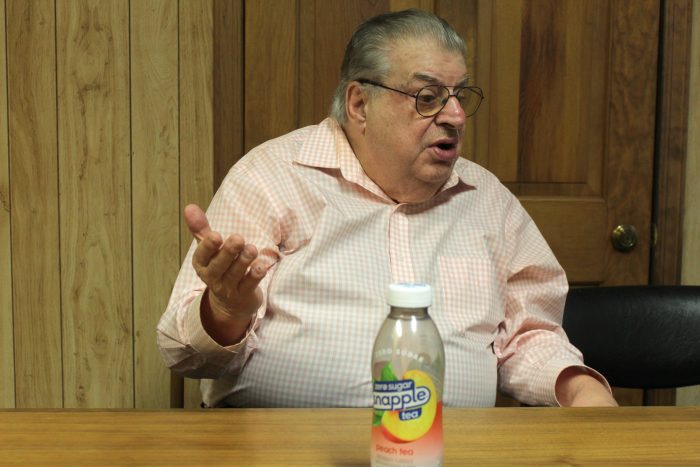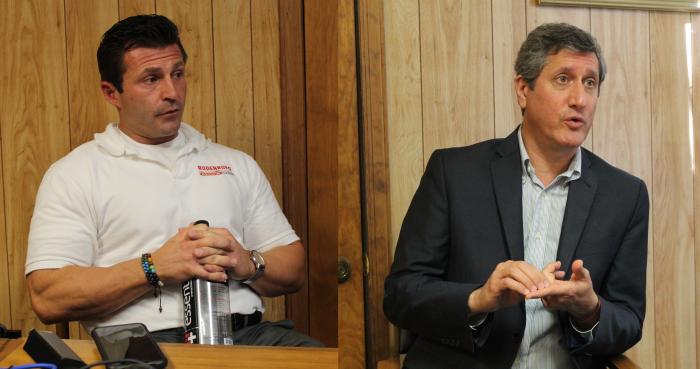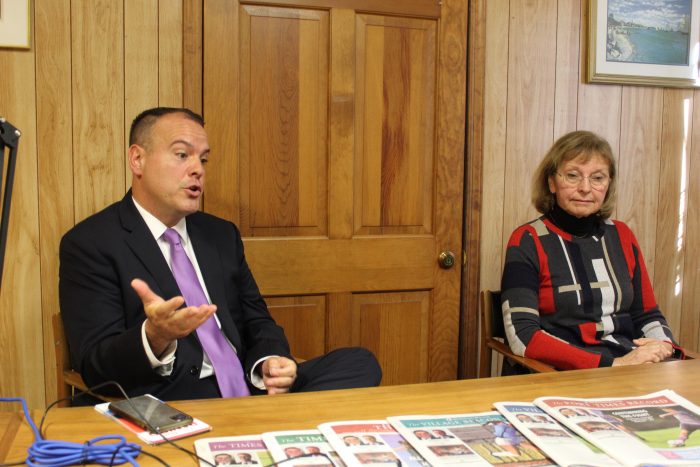By Mallie Jane Kim
Forty-year political veteran Steve Englebright (D-Setauket) is facing off against business development and government relations professional Anthony Figliola (R-East Setauket) to be the next Suffolk County legislator for the 5th District. The recent incumbent, county Legislator Kara Hahn (D-Setauket), vacated her seat in August to take up a New York State parks post.
The two candidates discussed current county issues in a rather tense debate hosted in the TBR News Media office. “Can you tell we are passionate?” Figliola asked at one point.
Indeed, their passion was evident as they expressed frustration about each other’s negative political mailings and questioned aspects of each other’s backgrounds. On the issues they discussed that were pertinent to governing the county, their differences were nuanced.
Key issues
Englebright previously held the county post for nearly a decade before he was elected in 1992 to the New York State Assembly, where he stayed until he narrowly lost his seat last year.
He said he felt his work in the county is not yet done, especially in light of the move last summer by the county Legislature to table a bill that would have allowed residents to vote on establishing a 1/8-cent sales tax to create a water quality protection fund, which would help add sewers and Innovative/Alternative septic systems.
“The future of drinking water in this county is in peril,” he said at the debate, pointing to the decision not to include the water referendum on November’s ballot. “They denied that opportunity for people to vote to determine the future well-being of their families and our communities.”
Figliola said he is invested in the community despite watching so many friends leave due to quality-of-life and cost-of-living issues. He said that a priority for him is making sure the Suffolk County Police Department has the resources it needs to fight crime, and in particular to address deadly fentanyl overdoses.
“This is a serious issue,” he said. “It doesn’t care about your political ideology or gender, it’s designed to kill — and we have to put these drug dealers in jail.”
Wastewater
Both candidates agreed Long Island has a wastewater issue — the sheer volume of cesspools on Long Island puts the area’s waterways and sole-source aquifer at risk.
Englebright claimed the county Legislature’s down vote of the referendum over the summer was an effort at voter suppression, assuming the clean water vote would have drawn more Democratic voters to the polls in November. “It was a partisanizing of an issue that has been bipartisan for years,” he said. “Our drinking water is a limited and finite resource, and it should not be partisanized. But it was.”
Figliola said he’s been supportive of the measure as a private citizen, but he also thought the bill, which would designate a majority of the funds to updated septic systems, had flaws. He argued there should be a 50/50 split of funds in order to add more sewers in places like Port Jefferson, Port Jefferson Station and other main streets, and perhaps a percentage of funds could be left as wiggle room.
“I would like greater flexibility to be able to give dollars more to sewers — or perhaps in 10 years, there’s some new technology that we don’t even know about, but we’re handcuffed because there are specific percentages,” he said.
Englebright rebutted that in the decade of preparation for the clean water bill, the proportion was worked out by Stony Brook University scientists and “field tested” in public hearings.
“It’s proportional that it’s about 75% of the problem is in cesspools, not in business districts,” he said.
Migrants and asylum seekers
Both candidates condemned the tactic by Republican governors of busing illegal migrants from border towns to Democratic-leaning so-called sanctuary cities, including New York City, as inhumane. But they agreed the county was right to block any move to bring the migrants to Suffolk, after Gov. Kathy Hochul (D) eyed SUNY campuses like SBU as temporary migrant housing.
The candidates said the county does not currently have the capacity to accept a sudden influx.
“You can’t just unilaterally start flooding this area without any preparations,” Figliola said, adding that there could be ways to activate churches and nonprofits to help out, but leadership on this issue needs to come from the federal government.
Englebright balked at any mandate to receive migrants without funding and time to prepare.
“New York City’s plight is serious and not New York City’s fault, but it shouldn’t be translated into Suffolk County,” he said. “There’s a way to do it the right way, and that’s not what has been proposed.”
Pedestrian/bike safety
Both candidates are pro-sidewalk, saying they think new developments should be required to install them, though Englebright said he sees a “built-in conflict” in mature communities where beautiful trees have grown up where sidewalks should be.
Englebright pointed to other solutions, like recreational walking and biking trails such as Trustees Road at West Meadow Beach and also to potential commuter routes, such as the Setauket-Port Jefferson Station Greenway and the bike paths on SBU’s campus — all of which he said he had a hand in creating through his position in the state Assembly.
But walkers on the Greenway itself see issues of safety and potential drug activity. Figliola said he would like to see bike patrols by the Suffolk County Police Department, and perhaps even call boxes along the trail for easier reporting.
“We need to give police the resources they need so that if you’re walking with your kids, you can feel safe,” he said.
Englebright agreed that the county has a big role to play. “Almost 200 acres of county parkland is strung like jewels on a necklace if the string of the necklace is the trail itself,” he said, suggesting county police should be involved, but this county land could easily house call boxes.
County police
Englebright called the Suffolk County Police Department “almost overwhelmingly the most important issue from an economic perspective of the county budget,” and said upcoming contract negotiations are important since public safety takes up about 70% of the budget.
“We need to have a clear-eyes reappraisal of how we go about the very real need to support our police and make sure the thin blue line is not made so thin that it weakens the protections we depend upon in our communities and for our children,” he said.
Figliola stressed again the need to give police the resources they need to keep communities safe but agreed the contract negotiation is important. “There has to be transparency in the process. We need to make sure what we do is in the benefit of the people,” he said. “We need to have a need matched with a public benefit.”
He also expressed frustration over positions at the county left open, particularly detective positions. He said the Suffolk administration under County Executive Steve Bellone (D) has been “crafty with budgeting” by not filling positions already in the budget and paid for by taxpayers.
Homelessness
Figliola said the county’s Department of Social Services could better coordinate with the towns to assist people living in encampments but said a huge factor is mental illness.
“We have to find a way to help these folks,” he said, suggesting a partnership with SBU to incentivize people to become social workers. “There’s not enough people to help those who are mentally ill.”
Englebright praised the county for working with nonprofit organizations on this issue, but said that could be expanded, and engaging with area churches in particular could work well. He said the county needs to find a way “to incentivize people to leave who are just camping out in open spaces and causing a lot of young families to not want to venture into those spaces.”
County District 5 voters will decide on these two candidates Tuesday, Nov. 7.


















































